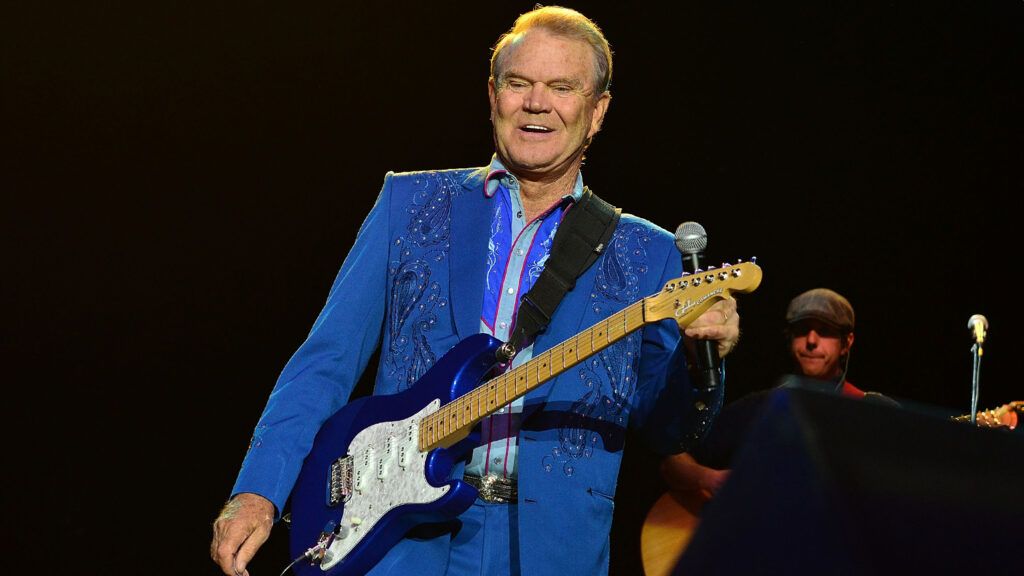I was pleased to see as our Throwback Thursday last week a Guideposts article from 1994 by Glen and Kim Campbell in honor of what would have been the great singer’s 85th birthday. He succumbed to Alzheimer’s in 2017 after a very brave and very public battle with the disease, Kim at his side.
I worked with Glen and Kim on that piece and got to know them a little. Glen was still a dozen years or so away from receiving his diagnosis of Alzheimer’s but looking back on the afternoon I spent with him, I can’t help but wonder if the earliest, pre-clinical signs were already there. At the time I was dealing with my own mother’s battle with dementia, which was entering a difficult stage when she would have to enter a memory care unit. And like Glen, I was struggling with my own recovery from alcoholism. Glen and Kim made such a strong impression on me that I included them in the book I am finishing for Guideposts on Alzheimer’s and my family and my own chance of getting the disease. I share that excerpt here:
It was around this time that I went out to Branson, Missouri, to interview Glen and Kim Campbell for Guideposts. When I met Glen, he was sprawled barefoot on a couch in his rented condo, a Martin guitar at his side and a Titleist putter waggling in his hands. There were golf balls all over the shag rug. The night before, I’d attended a concert at his temporary Branson theater. It had been an interesting show. The first half was a spirited romp through his greatest hits—“Wichita Lineman,” “Galveston,” “By the Time I Get to Phoenix”—played with such gusto that it was clear he still loved every note of Jimmy Webb’s classic compositions. It’s a wonderful thing to see a great artist who never tires of his material. It was decades after these hits had charted, decades filled with Glen’s alcohol and cocaine abuse, tabloid scandals, a broken marriage, a declining career, but Glen was still the Rhinestone Cowboy glittering under the stage lights in Branson, that Martin slung over his shoulder. He was more than a great artist. He was a great entertainer.
The second half of the show took a peculiar turn. I didn’t quite know what to make of it. It was Webb’s impressionistic Christian allegory based loosely on the Book of Revelation featuring modern dancers, dramatic sound and lighting effects, and not too much Glen Campbell. It lasted about a half hour and seemed weirdly incongruous for a place like Branson.
So, when Kim welcomed me into their condo, which overlooked a slightly burned-out golf course, I meant to ask Glen about the second act quasi-religious extravaganza. I was curious what it meant to him and why he made that choice, but I never got the chance. We discussed his early days in L.A. with the celebrated “Wrecking Crew,” a collection of crack studio players who backed both Sinatra and the Beach Boys; his eventual solo stardom, his wild days and subsequent sobriety and marriage to Kim; his recent immersive baptism in a creek near his boyhood home of Delight, Arkansas, conducted by his preacher brother. Just as I got around to asking him about the strange second act of his show, I noticed Glen staring longingly out his picture window at the golf course and twirling his putter. He had grown increasingly distracted, pacing and practicing his putting while he talked, sometimes seeming not to hear my questions so that Kim would prompt him or answer herself.
“I think I’ve taken up enough of your day off, Glen,” I said, putting away my notes.
He smiled and said, “Pleasure to talk with you. Kim and I are real fans of Guideposts and Dr. Peale.” And with that he pulled his clubs from a closet and was out the door.
“He’s a little ADD after six days of performing and eight shows,” Kim said with a laugh. “And golf is the one addiction he’ll never kick.”
Kim and I talked over coffee for another hour or so. She told me how incredibly hard it was for Glen to kick cocaine and booze. “Addiction had a stranglehold on his life,” she said, “until he gave himself completely to Christ. It was a miracle.”
Branson was part of the road back. It wasn’t always a smooth road. In the years ahead, Glen stumbled along the way, sometimes quite publicly, but Kim was always with him just like the music of Jimmy Webb.
Kim’s Rhinestone Cowboy left us in 2017 after his long battle with Alzheimer’s. I never got to ask about that strange interpretation of Revelation that I saw in Branson or why Glen performed it. I remember it ended with a staged reenactment of a violent storm that shook the theater to its rafters followed by a sunrise and a last number by Glen. I don’t remember the song. It wasn’t one of his hits. But I remember him standing alone in the center of the stage as the spotlight ever-so-slowly faded. There was a long silence before the audience rose to its feet and applauded. The applause lasted far longer than the silence.
I wonder now what effect Glen’s addiction might have had on his eventually developing Alzheimer’s. Did the booze and the coke prime his neurons for dementia? Might his restlessness and lack of concentration that day have been early signals of the disease rather than just the result of the rigors of his performance schedule?
Kim and Glen did the world a great service by being so open about his dementia. Even as the disease progressed, Glen performed for as long as he was able—even when Jimmy Webb’s unforgettable lyrics eluded him. It was both heartbreaking and inspiring to see and incredibly brave of him to get up on stage. I feel privileged to have once spent some time with him, even if I was keeping him from his golf game.






